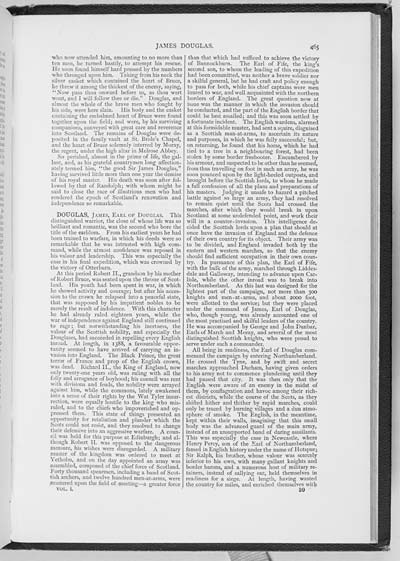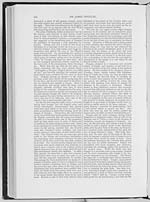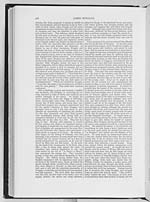465
who now attended him, amounting to no more than
ten men, he turned hastily, to attempt his rescue.
He soon found himself hard pressed by the numbers
who thronged upon him. Taking from his neck the
silver casket which contained the heart of Bruce,
he threw it among the thickest of the enemy, saying,
"Now pass thou onward before us, as thou wert
wont, and I will follow thee or die." Douglas, and
almost the whole of the brave men who fought by
his side, were here slain. His body and the casket
containing the embalmed heart of Bruce were found
together upon the field; and were, by his surviving
companions, conveyed with great care and reverence
into Scotland. The remains of Douglas were de-
posited in the family vault at St. Bride's Chapel,
and the heart of Bruce solemnly interred by Moray,
the regent, under the high altar in Melrose Abbey.
So perished, almost in the prime of life, the gal-
lant, and, as his grateful countrymen long affection-
ately termed him, "the good Sir James Douglas,"
having survived little more than one year the demise
of his royal master. His death was soon after fol-
lowed by that of Randolph; with whom might be
said to close the race of illustrious men who had
rendered the epoch of Scotland's renovation and
independence so remarkable.
DOUGLAS, JAMES, EARL OF DOUGLAS. This
distinguished warrior, the close of whose life was so
brilliant and romantic, was the second who bore the
title of the earldom. From his earliest years he had
been trained to warfare, in which his deeds were so
remarkable that he was intrusted with high com-
mand, while the utmost confidence was reposed in
his valour and leadership. This was especially the
case in his final expedition, which was crowned by
the victory of Otterburn.
At this period Robert II., grandson by his mother
of Robert Bruce, was seated upon the throne of Scot-
land. His youth had been spent in war, in which
he showed activity and courage; but after his acces-
sion to the crown he relapsed into a peaceful state,
that was supposed by his impatient nobles to be
merely the result of indolence. With this character
he had already ruled eighteen years, while the
war of independence against England still continued
to rage; but notwithstanding his inertness, the
valour of the Scottish nobility, and especially the
Douglases, had succeeded in repelling every English
inroad. At length, in 1388, a favourable oppor-
tunity seemed to have arrived of carrying an in-
vasion into England. The Black Prince, the great
terror of France and prop of the English crown,
was dead. Richard II., the King of England, now
only twenty-one years old, was ruling with all the
folly and arrogance of boyhood; his council was rent
with divisions and feuds, the nobility were arrayed
against him, while the commons, lately awakened
into a sense of their rights by the Wat Tyler insur-
rection, were equally hostile to the king who mis-
ruled, and to the chiefs who impoverished and op-
pressed them. This state of things presented an
opportunity for retaliation and plunder which the
Scots could not resist, and they resolved to change
their defensive into an aggressive warfare. A coun-
cil was held for this purpose at Edinburgh; and al-
though Robert II. was opposed to the dangerous
measure, his wishes were disregarded. A military
muster of the kingdom was ordered to meet at
Yetholm, and on the day appointed an army was
assembled, composed of the chief force of Scotland.
Forty thousand spearmen, including a band of Scot-
tish archers, and twelve hundred men-at-arms, were
mustered upon the field of meeting�a greater force
VOL. I.
than that which had sufficed to achieve the victory
of Bannockburn. The Earl of Fife, the king's
second son, to whom the leading of this expedition
had been committed, was neither a brave soldier nor
a skilful general, but he had craft and policy enough
to pass for both, while his chief captains were men
inured to war, and well acquainted with the northern
borders of England. The great question now at
issue was the manner in which the invasion should
be conducted, and the part of the English border that
could be best assailed; and this was soon settled by
a fortunate incident. The English wardens, alarmed
at this formidable muster, had sent a squire, disguised
as a Scottish man-at-arms, to ascertain its nature
and purposes, in which he was fully successful; but,
on returning, he found that his horse, which he had
tied to a tree in a neighbouring forest, had been
stolen by some border freebooter. Encumbered by
his armour, and suspected to be other than he seemed,
from thus travelling on foot in such an array, he was
soon pounced upon by the light-heeled outposts, and
brought before the Scottish lords, to whom he made
a full confession of all the plans and preparations of
his masters. Judging it unsafe to hazard a pitched
battle against so large an army, they had resolved
to remain quiet until the Scots had crossed the
marches, after which they would break in upon
Scotland at some undefended point, and work their
will in a counter-invasion. This intelligence de-
cided the Scottish lords upon a plan that should at
once have the invasion of England and the defence
of their own country for its object. Their army was
to be divided, and England invaded both by the
eastern and western marches, so that the enemy
should find sufficient occupation in their own coun-
try. In pursuance of this plan, the Earl of Fife,
with the bulk of the army, marched through Liddes-
dale and Galloway, intending to advance upon Car-
lisle, while the other inroad was to break into
Northumberland. As this last was designed for the
lightest part of the campaign, not more than 300
knights and men-at-arms, and about 2000 foot,
were allotted to the service; but they were placed
under the command of James, Earl of Douglas,
who, though young, was already accounted one of
the most practised and skilful leaders of the country.
He was accompanied by George and John Dunbar,
Earls of March and Moray, and several of the most
distinguished Scottish knights, who were proud to
serve under such a commander.
All being in readiness, the Earl of Douglas com-
menced the campaign by entering Northumberland.
He crossed the Tyne, and by swift and secret
marches approached Durham, having given orders
to his army not to commence plundering until they
had passed that city. It was then only that the
English were aware of an enemy in the midst of
them, by conflagration and havoc among their rich-
est districts, while the course of the Scots, as they
shifted hither and thither by rapid marches, could
only be traced by burning villages and a dun atmo-
sphere of smoke. The English, in the meantime,
kept within their walls, imagining that this small
body was the advanced guard of the main army,
instead of an unsupported band of daring assailants.
This was especially the case in Newcastle, where
Henry Percy, son of the Earl of Northumberland,
famed in English history under the name of Hotspur;
Sir Ralph, his brother, whose valour was scarcely
inferior to his own, with many gallant knights and
border barons, and a numerous host of military re-
tainers, instead of sallying out, held themselves in
readiness for a siege. At length, having wasted
the country for miles, and enriched themselves with
30

![]() Universal Viewer |
Universal Viewer | ![]() Mirador |
Large image | Transcription
Mirador |
Large image | Transcription
![]()

